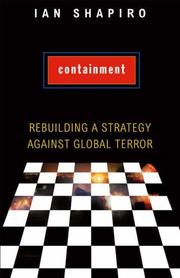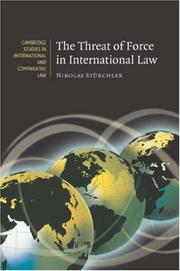| Listing 1 - 4 of 4 |
Sort by
|

ISBN: 9780691129280 0691129282 0691137072 9786612086847 1282086847 1400827566 9781400827565 9781282086845 9780691137070 Year: 2007 Publisher: Princeton : Princeton University Press,
Abstract | Keywords | Export | Availability | Bookmark
 Loading...
Loading...Choose an application
- Reference Manager
- EndNote
- RefWorks (Direct export to RefWorks)
In this powerfully argued book, Ian Shapiro shows that the idea of containment offers the best hope for protecting Americans and their democracy into the future. His bold vision for American security in the post-September 11 world is reminiscent of George Kennan's historic "Long Telegram," in which the containment strategy that won the Cold War was first developed. The Bush Doctrine of preemptive war and unilateral action has been marked by incompetence--missed opportunities to capture Osama bin Laden, failures of postwar planning for Iraq, and lack of an exit strategy. But Shapiro contends that the problems run deeper. He explains how the Bush Doctrine departs from the best traditions of American national-security policy and accepted international norms, and renders Americans and democratic values less safe. He debunks the belief that containment is obsolete. Terror networks might be elusive, but the enabling states that make them dangerous can be contained. Shapiro defends containment against charges of appeasement, arguing that force against a direct threat will be needed. He outlines new approaches to intelligence, finance, allies, diplomacy, and international institutions. He explains why containment is the best alternative to a misguided agenda that naively assumes democratic regime change is possible from the barrel of an American gun. President Bush has defined the War on Terror as the decisive ideological struggle of our time. Shapiro shows what a self-defeating mistake that is. He sets out a viable alternative that offers real security to Americans, reclaims America's international stature, and promotes democracy around the world.
Terrorism --- National security --- 854 Terrorisme --- 820 Internationale betrekkingen --- 876 Veiligheidspolitiek --- Prevention --- Government policy --- History --- 876 VeiligheidspolitiekPrevention
Book
ISBN: 9789025409456 Year: 2007 Publisher: Amsterdam Antwerpen Contact
Abstract | Keywords | Export | Availability | Bookmark
 Loading...
Loading...Choose an application
- Reference Manager
- EndNote
- RefWorks (Direct export to RefWorks)
World history --- anno 1900-1999 --- Guerre --- Oorlog --- Polemologie --- Polémologie --- War --- 815 Geschiedenis --- 820 Internationale betrekkingen --- 852 Internationale conflicten --- BPB0903 --- Causes --- World politics --- 20th century

ISBN: 1107181380 1281086045 9786611086046 1139132792 0511350872 0511494335 0511349114 0511348142 0511349971 9780511349973 9780511349119 9780511494338 9780521873888 0521873886 9780521133616 0521133610 9780521133616 Year: 2007 Publisher: Cambridge : Cambridge University Press,
Abstract | Keywords | Export | Availability | Bookmark
 Loading...
Loading...Choose an application
- Reference Manager
- EndNote
- RefWorks (Direct export to RefWorks)
Threats of force are a common feature of international politics, advocated by some as an economical guarantee against the outbreak of war and condemned by others as a recipe for war. Article 2(4) of the United Nations Charter forbids states to use threats of force, yet the meaning of the prohibition is unclear. This book provides the first comprehensive appraisal of the no-threat principle: its origin, underlying rationale, theoretical implications, relevant jurisprudence, and how it has withstood the test of time from 1945 to the present. Based on a systematic evaluation of state and United Nations practices, the book identifies what constitutes a threat of force and when its use is justified under the United Nations Charter. In so doing, it relates the no-threat principle to important concepts of the twentieth century, such as deterrence, escalation, crisis management, and what has been aptly described as the 'diplomacy of violence'.
Ultimatums (International relations) --- Aggression (International law) --- Crimes against peace. --- Incitement to war --- Peace, Crimes against --- War, Incitement to --- War propaganda --- Crime --- Peace --- International law --- Ultimatums --- International relations --- 820 Internationale betrekkingen --- 821.4 Internationale rechtspraak --- Aggression (International law). --- Ultimatums (International relations). --- Ultimatums. --- Aggression (International law ) --- Law --- General and Others
Periodical
ISSN: 17495679 17495687 Year: 2007 Publisher: Malden, MA : Published on behalf of the International Studies Association by Blackwell,
Abstract | Keywords | Export | Availability | Bookmark
 Loading...
Loading...Choose an application
- Reference Manager
- EndNote
- RefWorks (Direct export to RefWorks)
International Political Sociology provides both theoretical and empirical explorations of the following issues: IR Theory and the sociology of the discipline; Major works of various sociologists and their impact on the study of IR; Critical discussion of the notions of frontiers, boundaries and limit; and International Political Anthropology of mobility. These themes are not exclusive and other possibilities include works on global patterns of urbanization, international policing, military sociology, political opinion and communication, the sociology of culture, the sociology of political movements, and the transnational effects of the reshaping of national, cultural and religious identities.
Political sociology --- International relations --- Political science --- Sociology --- Sociologie politique --- Relations internationales --- Science politique --- Sociologie --- Periodicals. --- Social aspects --- Periodicals --- Périodiques --- Aspect social --- International relations. --- Political science. --- Political sociology. --- Sociology. --- 801 Tijdschriften --- 820 Internationale betrekkingen --- Social Sciences --- Political Science --- Social theory --- Mass political behavior --- Political behavior --- Civil government --- Commonwealth, The --- Government --- Political theory --- Political thought --- Politics --- Science, Political --- Coexistence --- Foreign affairs --- Foreign policy --- Foreign relations --- Global governance --- Interdependence of nations --- International affairs --- Peaceful coexistence --- World order --- Sociological aspects --- Social sciences --- State, The --- National security --- Sovereignty --- World politics --- Society.
| Listing 1 - 4 of 4 |
Sort by
|

 Search
Search Feedback
Feedback About UniCat
About UniCat  Help
Help News
News